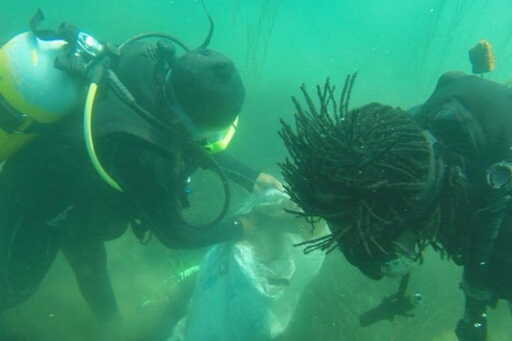CAPE MACLEAR, Malawi — On a clear August morning, three scuba divers disappeared under the waters of Lake Malawi. Above them, serenity: The clear water rippled gently, spick-and-span Cape Maclear Beach was empty of tourists and the shoreline trees stood calm. Half an hour later, having covered an area just 30 meters (100 feet) from the beach, the divers emerged, each hauling a bag half-full with garbage. “This is only a fraction of what’s down there, yet we also cleaned the area last week. That’s our challenge,” one of the divers, Felix Sinosi, told Mongabay. He has been a scuba diver on this shoreline for the past eight years and now trains others. “You won’t believe the waste volumes down there. … And I am talking about the Cape Maclear area only,” said Sinosi, age 31. Sinosi and 14 other divers are part of an underwater garbage collection project in Lake Malawi National Park, a UNESCO World Heritage Site on the southern end of the lake. The park is known for its radiant cichlids (family Cichlidae), the lake’s prized ornamental fish that have drawn global research interest for their explosive diversity. Local environmentalists say the garbage problem likely extends throughout Lake Malawi, the world’s fourth-largest freshwater lake by volume. Kenneth McKaye, a Finnish marine biologist whose research led to the national park’s establishment in 1980, introduced the underwater garbage collection initiative in 2023 after noticing the problem during dives with tourists. “Visibility was poor,” Violet Zacharia, manager and volunteer coordinator…This article was originally published on Mongabay
From Conservation news via this RSS feed


